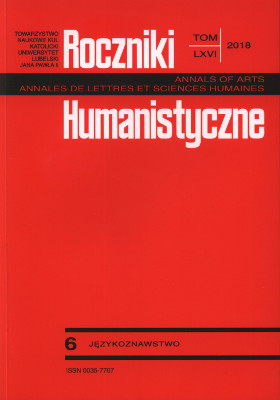Językowe mechanizmy apoteozy walki o niepodległość we wspomnieniach uczestniczek I wojny światowej (w kontekście pamięci zbiorowej)
Language mechanisms of apotheosis of the struggle for independence in the memories of the World War I participants (in the context of collective memory)
Author(s): Magdalena HawryszSubject(s): History, Language and Literature Studies, Theoretical Linguistics, Recent History (1900 till today), Pragmatics, Pre-WW I & WW I (1900 -1919)
Published by: Towarzystwo Naukowe KUL & Katolicki Uniwersytet Lubelski Jana Pawła II
Keywords: apotheosis of struggle for independence; linguistic means of glorification; feminine memories; memories of World War I; independence discourse
Summary/Abstract: The aim of the undertaken analysis is to identify linguistic ways of the glorifying approach to the struggle for independence and a try to determine the role of such descriptions in the society of the Second Polish Republic. The material for analyzes is the volume titled Służba Ojczyźnie. Wspomnienia uczestniczek walk o niepodległość [Serving the Homeland: Memories of 1915-1918 Independence Struggle Participants] (1929) which is a valuable source of research that has not been used so far for research on independence discourse. Memories respond to the official need of remembering and experiencing a moment valid for the national community, and they also realize a social expectation of the imagined role of women in an extreme situation of the statehood threat. Hence the specificity of the description of past events, in which one must see the active organization of the discursive space. One of the expressive mechanisms of this activity is the apotheosis of independence actions. The observations made allow to state that the most visible and most frequently occurring mechanisms of the apotheosis of pro-independence actions in the memories of the participants of World War I are: 1) an idealized image of female soldiers characterized by determination in action and ideological maximalism, 2) exaltation of the description manifested in the accumulation of names of feelings, especially positive ones, and stressing the intensity of emotions, 3) finally the atmosphere of sublimity, which at the level of language is revealed in the presence of the highest values. These mechanisms are strengthened by the presence of various graphic elements and stylistic means.
Journal: Roczniki Humanistyczne
- Issue Year: 66/2018
- Issue No: 6
- Page Range: 43-55
- Page Count: 13
- Language: Polish

